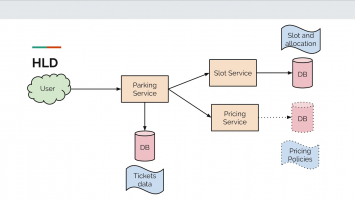Top 6 Best Online System Programming Courses
Systems programming aims at students who are proficient in an object-oriented programming language like Java or Python, and have completed a course on data ... read more...structures, but would like a deeper understanding of how "real world" computing systems are built. Here are some best online system programming courses listed by Toplist.
-
This course is about creating your own remote procedure calls. They'll be using Linux for this course, but you may use Windows if you're familiar with it. The essence and true strength of this course is that no third-party libraries are used. This idea guides all of their other courses. Whatever you learn in their classes, you learn from the ground up. This course adheres to the notion and teaches you how to develop remote procedure calls from the ground up—no framework, tools, supporting libraries, or anything else—just pure C. This course builds the groundwork for many future system software projects. A few of which are listed below and are part of the course curriculum.
Remote Procedure Calls (RPC) are a way of invoking a function or procedure that really exists on a distinct physical computer that is operating someplace else on the network—hence the name "remote procedures." This course will teach you the ideas that function behind the scenes. The same notions may be expanded to incorporate other system programming concepts, such as data synchronization and checkpointing the application state, in addition to RPC. In its initial edition, this course promises to provide all the information on creating RPCs.Please take this course only at your own risk. You should be familiar with C pointers and how C objects are stored in memory. They anticipate you to be at least intermediate in C programming. This indicates that only the most eager students who wish to get an advantage over their college's brightest student should join. Please pardon the average students. Job seekers and professional developers are required to enlist. The ideas taught in this course are language agnostic, allowing you to construct RPC/Data-Synch/Checkpointing in any programming language of your choice. If you work in Java tomorrow, you will understand how RPCs function at the most basic level of implementation.
Who this course is for:
- Students who want to distinguish themselves from the crowd
- Professionals looking to advance their career Or switch jobs
- those Who love Coding and build actual System softwares
Requirements:
- C programming language - at-least an intermediate level
- Minimal Socket programming to the extent to send and receive data is desirable but not mandatory
- Linux OS, any flavor, - Running as Native or as a VM
- Most Important tool - Enthusiasm and love for knowledge
Udemy rating: 4.9/5
Enroll here: https://www.udemy.com/course/linuxrpc/
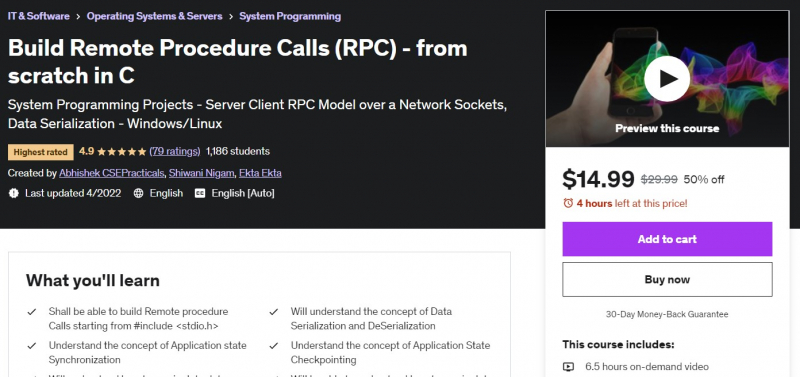
https://www.udemy.com/ 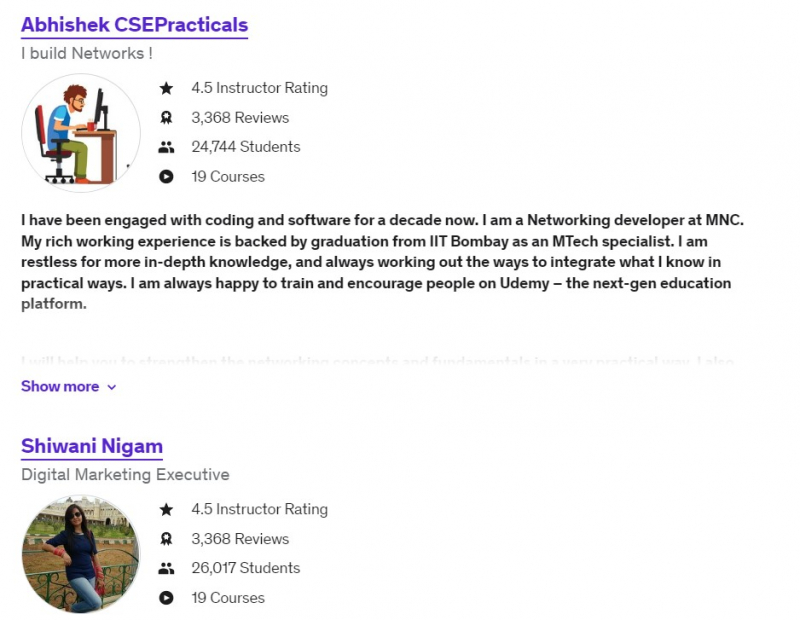
https://www.udemy.com/ -
This course will walk you through a case study in which they construct the Pseudo Interior Gateway Protocol, which is comparable to OSPF (Open Shortest Path First) and ISIS (Intermediate System to Intermediate System). ISIS and OSPF are both IGP protocols that achieve the same goals and fall under the category of link-state protocols. Don't worry, you'll cover all of the required theories about what you'll be doing in the project before you write the first line of code. This entire course is separated into three parts: Part A, Part B, and Part C, with Parts A and B now live and Part C under development as of November 11, 2021.
Using their tcp-ip stack library, they will implement the simplified version of the true ISIS protocol. The purpose is to master the subtleties of building a common network protocol on a device from the ground up. You'll be doing it for the rest of your life if you work in business, but this case study will provide you with direct experience with what it takes to install a common network protocol on a (simulated) device.If you are giving an interview at the firm for a network developer position, entry-level up to 2-3 years of experience, or making a cross-domain transition into networking development, the interviewer will have chills seeing the above mention of the project in your CV. You will be chosen without a doubt if you can answer cross-questions (which they will explain in this course). Maintain GitHub so that you may show him your code if he asks. This is one of the best online system programming courses.
Who is this course for?
- Core Developers aiming to work in the Networking/Distributed Systems/System Programming side
- This is not for those seeking non-development roles (this is a pure Dev-oriented course).
- Not for those still struggling with basic data structures and basic C programming concepts.
- Working professionals, Job Seekers, domain changers to Networking Dev, Learners, starving for knowledge
Requirements:
- Basic L2 and L3 Networking knowledge
- Should be excellent with pointers, pointer arithmetic
- Must understand memory manipulations in C programming
- Patience, fighters, challengers, winners
Udemy rating: 4.8/5
Enroll here: https://www.udemy.com/course/nwdev_from_scratch/
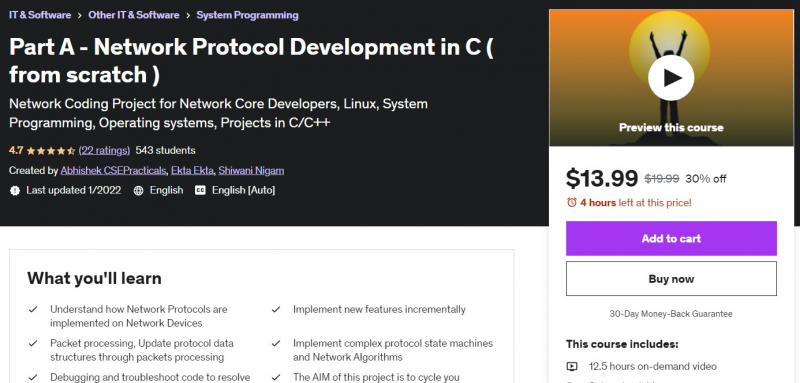
https://www.udemy.com/ 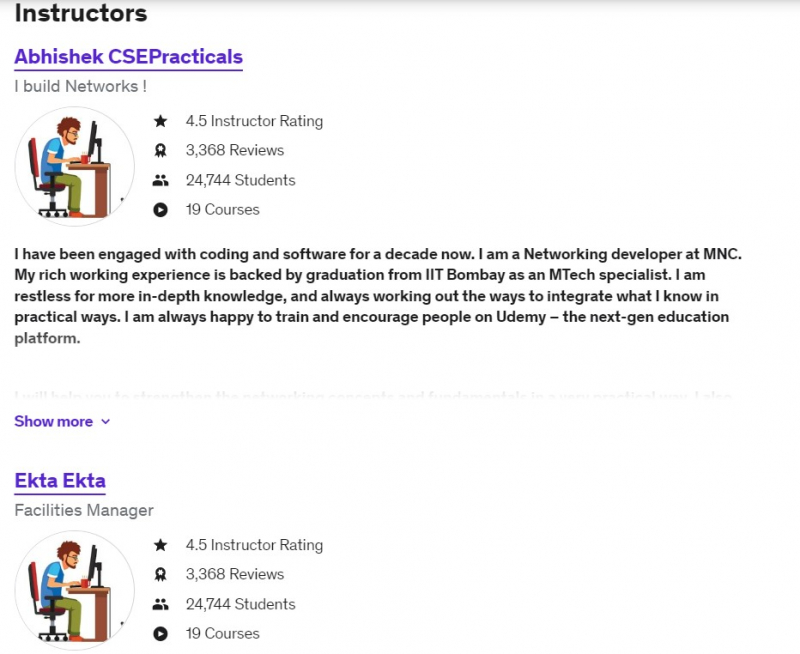
https://www.udemy.com/ -
The goal of this course is to prepare you for system programming technical interviews, with interview levels ranging from beginner to intermediate. This course is intended for (potential) developers rather than testers or system administrators. This course was created to bridge the gap between novice or beginner and intermediate or advanced programmers. This course presumes that you are at least above average at programming (in any programming language, although C/C++ is preferred)—that you understand memory allocations, all types of loops, function calls, pointers, and so on. In this course, they will not teach C/C++ (there are already many courses available online), but rather programming strategies and low-level information about how a C program works behind the scenes-all of which are highly relevant in an interview. Their goal is to expand this course into the Linux/C Bible.
However, they believe that in this day and age, you must outwit your coworkers, so they made this endeavor to offer you the wisdom and information that is essential for a programmer. They've encountered students who can create solid C/C++ programs but don't understand how to construct better structured, manageable, extendable, and programmable code in the form of libraries. Students, for example, are very strong at competitive programming but do not know how to construct a simple Makefile since academics do not educate and students do not want to learn.
In this course, they will cover subjects such as building Linux System Libraries (version 1) and Advanced language-agnostic Programming Concepts (release 2), which might be useful if you decide to become a programmer in another language in the future. This is one of the best online system programming courses.
Who is this course for?
- Students who have basic knowledge of C/C++ programming
- Warning : Not for absolute beginners in programming
- who want to take their programming skills from beginner to professional level.
- Final year students looking to crack the interview questions on OS and C programming
Requirements:
- Basic knowledge of Programming in C/C++ is required
- Zeal and enthusiasm to learn and sharpen the skills
- Good to have basic OS knowledge but not mandatory
Udemy rating: 4.7/5
Enroll here: https://www.udemy.com/course/advance-programming-concepts/
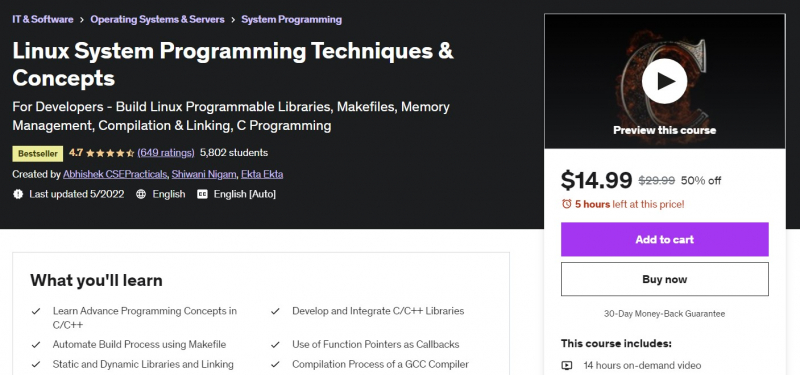
https://www.udemy.com/ 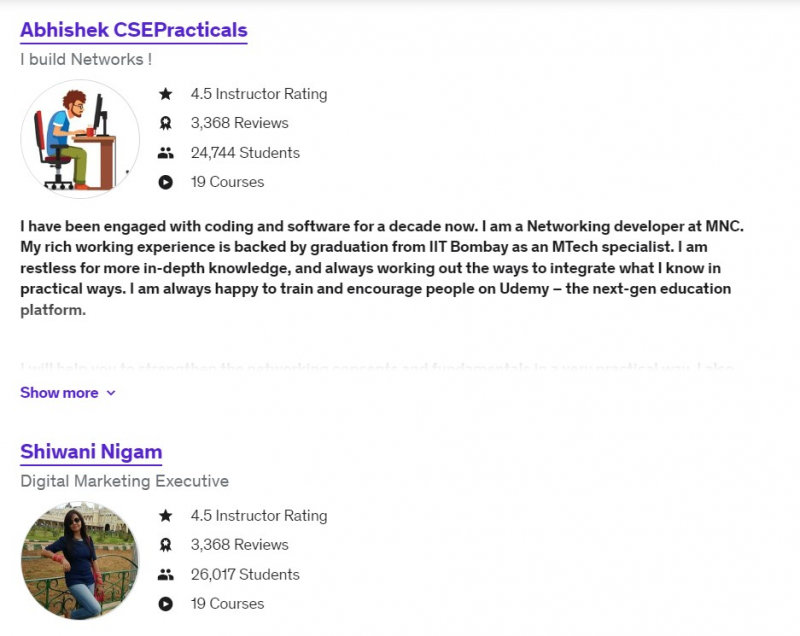
https://www.udemy.com/ -
This course has already been taken by over 10,000 students, with over 900 positive evaluations. Have you ever attempted to learn about the ARM Cortex M3/M4 Processor by reading a book or technical documentation only to become frustrated? Have you found yourself seeing bits and pieces all over the globe but unable to put them all together to form a whole picture? This course is designed for embedded engineers and students who wish to understand and write ARM Cortex M3/M4-based controllers by delving deeply into their internals and programming features. Don't be concerned if you're unfamiliar with the ARM-based controller.
This course will teach you all you need to know to get started quickly with programming Cortex M3/M4-based controllers. The lab session includes a variety of programming projects to help you remember the ideas better. Watching lectures, programming assignments, and a lot of animations can save you hours of self-study time and give you the confidence to look at embedded processors in a new light. So, this year, learn something new to help you get ahead at work.
This course will save you countless hours of studying, trying, and googling to learn about this processor. They will personally respond to any questions you have regarding this material, either privately or in a group setting. If you are dissatisfied for any reason, Udemy will give you a complete refund within 30 days. There were no questions. But they convinced you will not have to. They wholeheartedly support this course and a dedicated to assisting you. This is one of the best online system programming courses.
Who is this course for?
- Professionals interested in exploring embedded systems
- Hobbyists and students who want to start their career in the embedded world will be
- If you think about being embedded, then think about taking this course. You will not be disappointed.
Requirements:
- Basic knowledge of C and Microcontroller could be an added advantage but not mandatory.
Udemy rating: 4.6/5
Enroll here:https://www.udemy.com/course/embedded-system-programming-on-arm-cortex-m3m4/
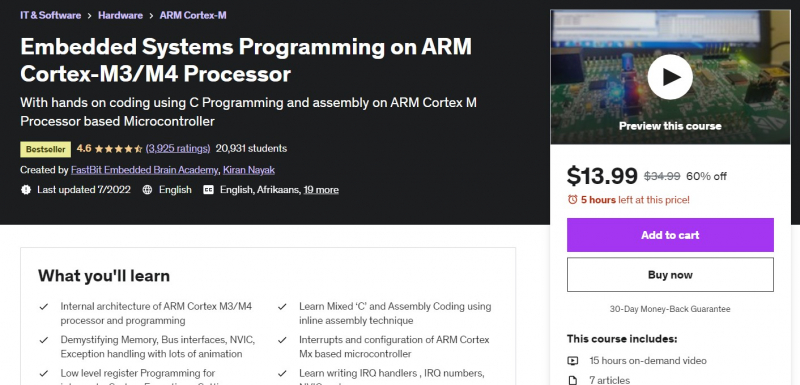
https://www.udemy.com/ 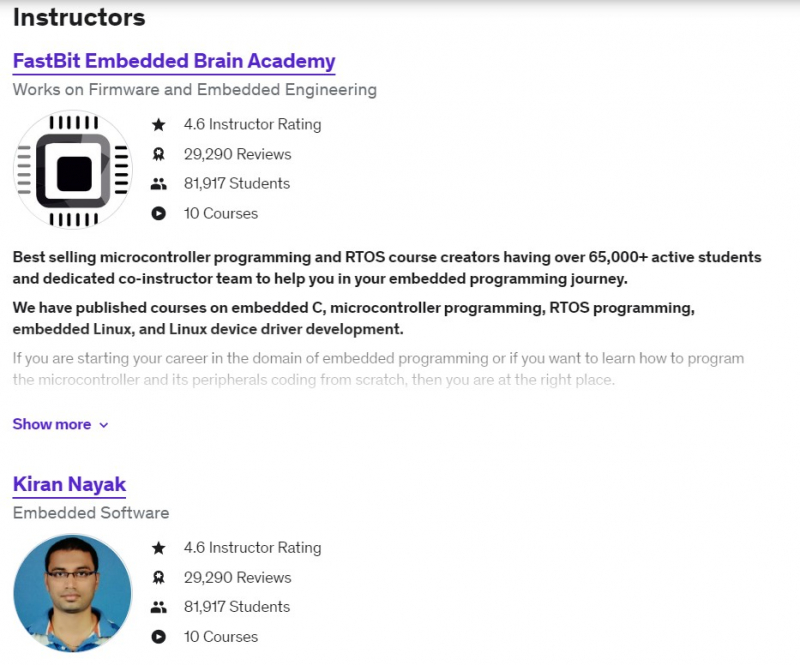
https://www.udemy.com/ -
This course is aimed at providing you with a good foundation in bare-metal firmware creation for ARM-based microcontrollers using a programming-based approach. The purpose of this course is to teach you how to explore the microcontroller reference manual and datasheet to extract the information you need to construct professional peripheral drivers and firmware. This course uses no libraries, only bare-metal embedded-c and register manipulations to achieve this purpose. To make things easier, this course is available on a variety of ARM Cortex-M development boards, allowing students to practice the methods on an ARM Cortex-M development board of their choosing. The STMicroelectronics STM32F4-NUCLEO with an ARM Cortex-M4 microcontroller is used in this edition of the course.
This is unlike any other course you've ever taken since it's a professional, hands-on "field guide" to SM32 bare metal firmware development. The reason for this is that there is no fluff or filler. It gets right to the point, telling you exactly what to do, how to do it, and why. It's also simple. And you'll instantly "understand" the complete mythology they employ in their job life to design firmware for consumer products.
Before developing the firmware for any chip you have to learn how to read the documentation provided by the chip manufacturer. All components on the microcontroller have an address range. To write to a component or read from a component you need to locate its address range in the documentation and properly define the addresses in your code. The addresses in the address range of a component represent the registers of that component. To access these registers you have effectively typecast the addresses. Cortex-Microcontroller Interface Standard (CMSIS)CMSIS is a standard developed by Arm for all Cortex-Microcontrollers. This is the standard used in professional firmware development
Who this course is for:
- If you are an absolute beginner to embedded systems, then take this course.
- If you are an experienced embedded developer and want to learn how to professionally develop embedded applications for ARM processors, then take this course.
Requirements:
- No programming experience needed - They'll teach you everything you need to know.
- They shall be using the STM32 IDE which is FREE.
Udemy rating: 4.5/5
Enroll here: https://www.udemy.com/course/embedded-systems-bare-metal-programming/
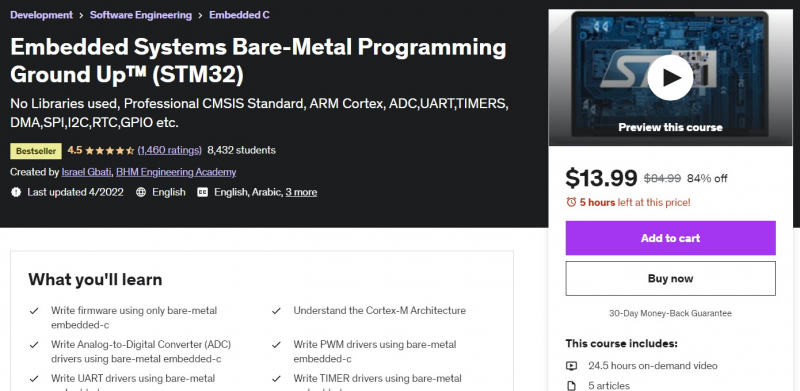
https://www.udemy.com/ 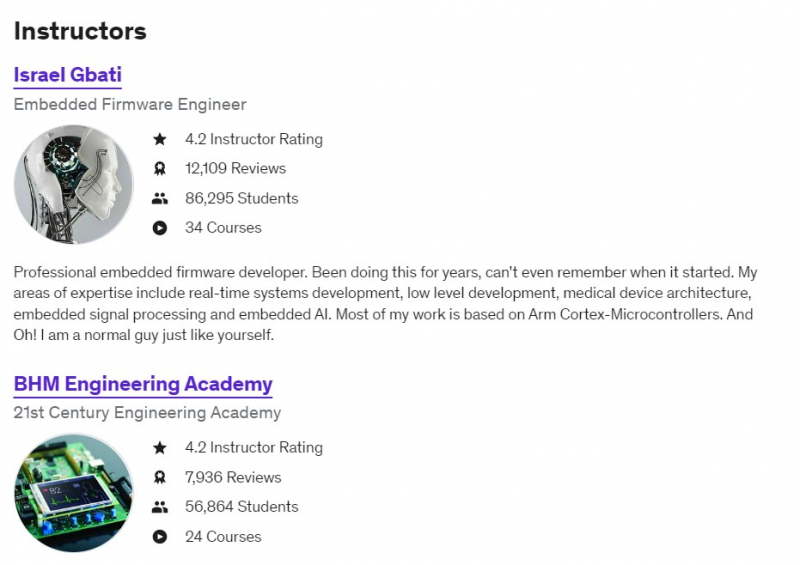
https://www.udemy.com/ -
This course will teach you how Linux processes communicate with one another. This is a subset of the Linux System Programming domain. You will investigate different prominent industrial mechanisms for transferring data across Linux processes. You will go through the ideas behind each IPC mechanism in depth, discuss implementation, and build and analyze scenarios in which the chosen IPC is preferable over others. You also cover how applications should be constructed to make use of the IPC features provided by the underlying Linux operating system.
Assignments will be assigned whenever feasible, and there will be one project throughout the course in which you will be slowly implementing the new IPC approach you have learnt. You will have practiced and used all the IPC skills acquired in this course at the conclusion of the course. You will have a full code walk for each IPC mechanism in which they will show you how a specific IPC mechanism is implemented on the sending and receiving sides. When you first enter the sector, you will see that IPC principles are being deployed all over the program to ease communication between different sections of the software.
This course is intended for undergraduate students, job seekers, and professional developers. This is a MUST-DO training for individuals who wish to work as a developer in an MNC. Because IPC is virtually always used to carry out data interchange between processes in System Programming, students graduating in computer science and searching for a job as a developer in MNCs should have IPC ideas at their fingertips. This is one of the best online system programming courses.
Who this course is for:
- Under graduate Computer Science Students
- Post Graduate Students
- Job Seekers in System programming Domain - Networking/Driver programming/Distributed Systems/IOT etc
Requirements:
- Basic C is essential
- Basic knowledge Operating System shall be good
- Zeal and Enthusiasm to learn
Udemy rating: 4.5/5
Enroll here: https://www.udemy.com/course/linuxipc/
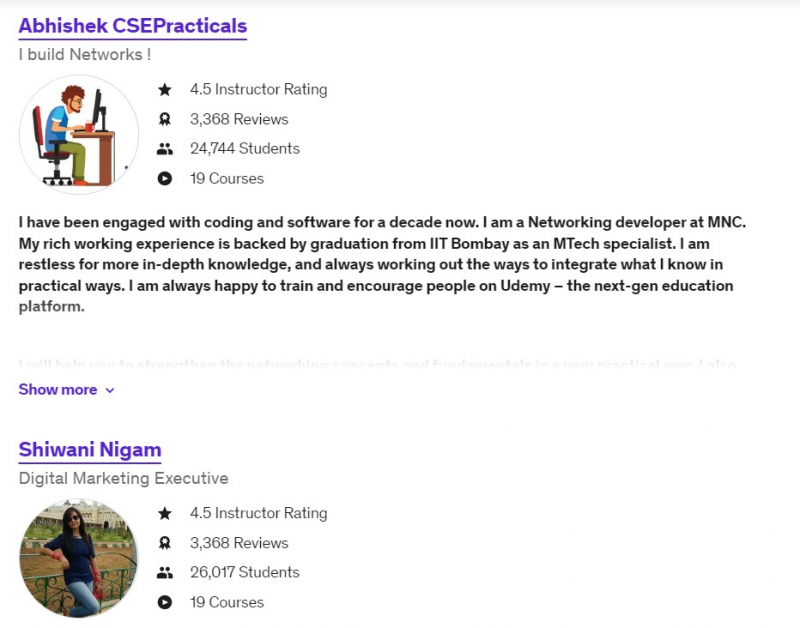
https://www.udemy.com/ 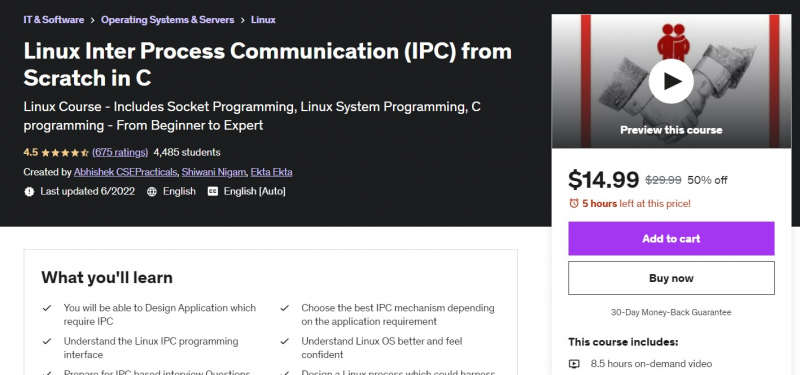
https://www.udemy.com/










